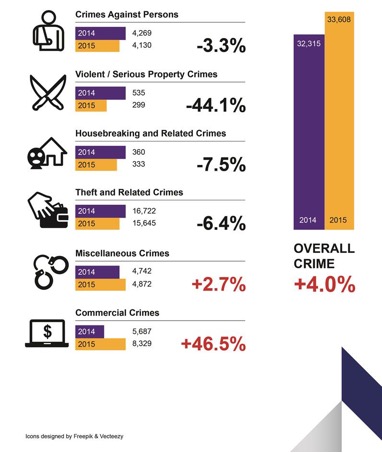Just what is it with people and their need for love or sex that blinds them to all common sense and lands them in all sorts of trouble?
According to the Singapore Police Force's annual crime brief for 2015, released on Friday, online scams (classified under "commercial crimes") saw the greatest increase from 2014 as compared to all other types of crimes.
In fact, nearly all others saw decreases, with violent and serious property crimes as well as housebreaking crimes hitting a two-decade low last year. The number of thefts and related crimes also hit a 10-year low, according to a release from the Police issued on Friday afternoon.
See the breakdown for yourself:
 Graphic: Singapore Police Force
Graphic: Singapore Police Force
So what are these online scams that more and more people are falling for? We'll introduce you to two of them:
1. The Internet Love Scam
 Screenshot from Facebook
Screenshot from Facebook
This involves the scammer approaching you on a social media platform (it could be Facebook Messenger, WeChat, LINE or others), and start by declaring his or her keenness in befriending you.
After an exchange (usually a couple of weeks, perhaps), the man or woman makes an unnaturally immediate declaration of love for you — bear in mind, by the way, you haven't met in person before — and all of a sudden, the love of your life is making plans to fly here to meet you.
Before you know it, he or she suddenly needs your help! He needs you to transfer a thousand dollars to him or her for this or that very urgent reason, and is extraordinarily vague about the details.
This is one of the worst scams, since it involves emotions and relationships, and it shows — only 383 cases were reported in 2015, double that in 2014, but some $12 million was cheated from victims, with one person forking out a crazy $528,000.
Sure, talk to people and make friends online if that's your game, but the moment a person you've never met asks you for money, run as fast as you can in the other direction.
2. The Credit-for-sex Scam
 Screenshot from ScamAlert.sg
Screenshot from ScamAlert.sg
So far, only guys have been targeted in this — stranger girl adds you on WeChat or iAround, and sends you a pretty picture of herself, or has an attractive-looking profile picture.
She types either in broken English or in Chinese, and is usually a student in Singapore or something to that effect. She'll then keep talking to you, as long as you keep replying to her, and confide either a) that she offers cheap sexual services and is happy to loop you in on it or b) that she's keen to meet you and get to know you better.
But first, she'll need you to buy her a $100 or $150 Alipay or iTunes card, scratch the code and take a picture to show it to her so she can use it. Next thing you know, you'll get a call from her "pimp/boss" and you'll have to transfer a $500 security fee or a $1,000 deposit to a specified number, or else he will deploy his teams of gangsters to ruin the lives of your family.
Staff at 7-11 and Cheers are so used to this gig that they've started actually advising people against buying the cards and going ahead with the scam. But yet, it seems to be happening — the number of cases leaped more than 10-fold between 2014 and 2015 to more than 1,200.
More than $2.9 million was cheated in these thousand or so cases, with one guy being cheated of $74,000. So the moment you hear a girl ask you for a store card, delete her as a contact immediately.
A large number of scams on the rise revolve around e-commerce — business collaboration propositions, jobs for easy money, e-coupon sales or giveaways that sound too good to be true (like this Ray-Ban one) — and these, last year, have cheated people of a collective $1.76 million.
Our advice to avoid that: be smart, and be cautious whenever you're asked for personal data or money — of any kind.
Top photo from ScamAlert.sg.
If you like what you read, follow us on Facebook and Twitter to get the latest updates.
If you like what you read, follow us on Facebook, Instagram, Twitter and Telegram to get the latest updates.
